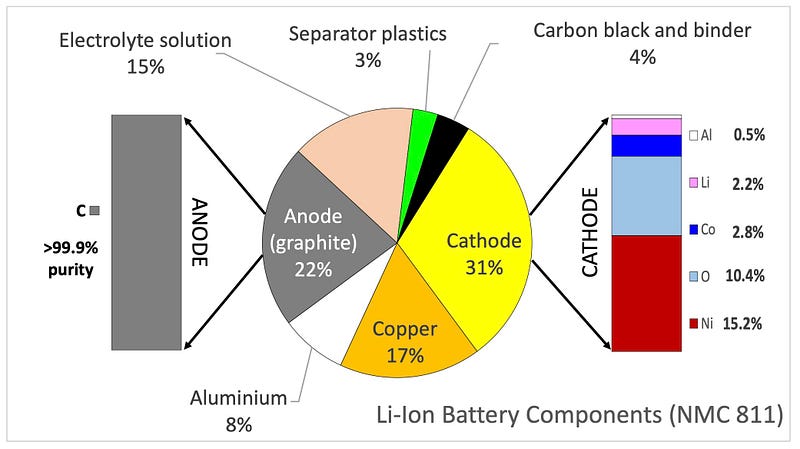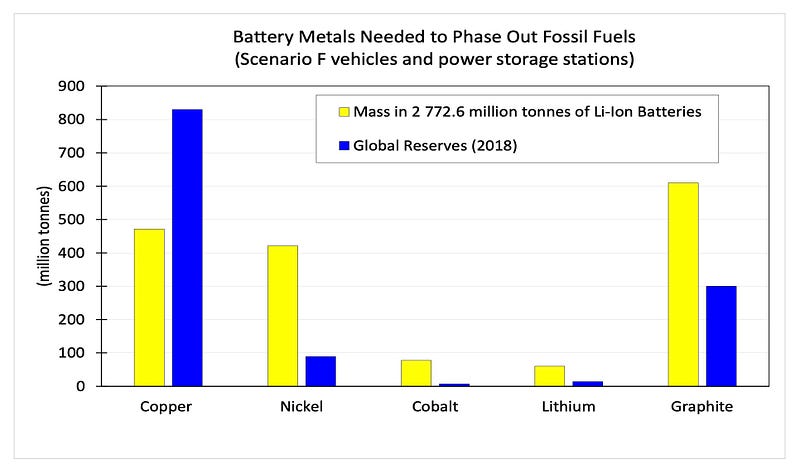The Illusion of Electric Vehicles as a Solution to Our Problems
Written on
Chapter 1: The Promise of Electric Vehicles
In today's consumer-driven society, owning a car is a significant asset for many individuals. With the environmental challenges posed by capitalism, electric vehicles (EVs) are often marketed as a sustainable solution. The allure is that we can maintain our fossil fuel-driven lifestyles while transitioning to something ostensibly better for the planet. However, is this promise valid?
As we consider the long-term implications, it becomes evident that we cannot pursue unlimited growth on a planet with finite resources, regardless of the energy source. The impact on wildlife, whether from gasoline or electric cars, is merely a matter of timing. Yet, many are focused on the short-term benefits of electric vehicles. Can we genuinely shift to EVs in a way that contributes positively to our planet's future?
The Numbers
In a comprehensive analysis, Simon Michaux details the significant challenges of replacing fossil fuels with alternative energy systems. His document, spanning 1,000 pages, emphasizes that electric vehicles are just a part of a much larger equation. The current global vehicle population, estimated at 1.416 billion in 2016, continues to grow, necessitating an even greater number of EVs.
Each EV requires a battery that is dependent on various minerals. Michaux's research shows that producing enough batteries to replace our existing vehicles will demand vast quantities of non-renewable resources:

To replace the current fleet, we would need approximately 300 million tonnes of Lithium-Ion batteries, which translates to nearly half of the world's known nickel reserves, 45% of lithium, and over 100% of cobalt reserves. This scenario highlights a critical issue: the materials needed for electric vehicles are finite and diminishing.
As Michaux points out, while there may be sufficient global reserves of nickel and lithium for one generation of batteries, the demand for cobalt is already a problem. The reality is that we would need to continually extract these minerals for each new generation of vehicles, which is not sustainable.
The Environmental Impact
Transitioning to electric vehicles isn't just about the batteries. If we generate electricity for EVs from fossil fuel sources, we still face significant CO₂ emissions. For EVs to be genuinely eco-friendly, they must be powered by renewable energy sources, which introduces another layer of complexity regarding energy storage.

To power a fully electric fleet, we would need to tap into vast amounts of copper and graphite, requiring a staggering increase in mining output. The feasibility of this is questionable, as it could demand resources that simply don't exist in sufficient quantities.
While recycling is often suggested as a solution, the current percentage of electric vehicles on the road is minimal. This means that the materials needed for the first generation of EVs cannot be sourced from recycling alone, leading to inevitable shortages in the future.
The Reality Check
Ultimately, the notion that electric vehicles will revolutionize our civilization is misleading. The fundamental issue of growth and consumption remains unchanged, and the idea that EVs can save the planet is a marketing tactic rather than a viable solution.
Michaux concludes that while the technology to transition to electric vehicles exists, the practical challenges are immense. For short-range transport, electric vehicles are indeed a suitable option, requiring substantial battery capacity and an enormous amount of electricity from the grid.
Conversely, long-distance transportation may be better suited for hydrogen fuel cells, which also require significant energy and resources to produce.
Future enthusiasts often argue that we can seamlessly transition from internal combustion engines to electric vehicles and hydrogen power, but this overlooks the critical reality: we are running out of essential minerals needed for this transformation.
In summary, we must recognize the limitations of our current system. To genuinely address climate change, sacrifices and a reevaluation of our ambitions are necessary. The dream of a sustainable future powered by electric vehicles is as unrealistic as the survival of dinosaurs in a warming world. The math reveals that EVs may only provide a temporary reprieve before we face a more severe reckoning.
Chapter 2: The Path Forward
The first video, "Why Electric Cars Won't Save Us," delves into the misconceptions surrounding electric vehicles and their environmental impact.
The second video, "HERE'S WHY ELECTRIC CARS WON'T SAVE US AND WHY THEY AREN'T THE FUTURE," discusses the limitations of EVs in the context of a sustainable future.